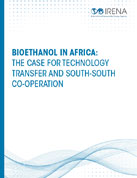Bioethanol in Africa: a case for technology transfer and South-South cooperation
 Sustainable biofuels have an important role to play in Africa’s development. Sugarcane bioethanol is currently the most cost-effective commercial biofuel and has the highest energy balance. The bioethanol industry, like sugar production, has matured in technological terms. Yet processes could be optimised and productivity further improved, with more efficient use of energy and other resources. This paper presents an overview of the concerns affecting sugarcane bioethanol production in Africa and provides recommendations for resolving them. Land tenure and land use for bioethanol feedstock production continue to present challenges, as do agricultural practices and productivity, food security and environmental risks. The industry also needs better infrastructure, policies, quality assurance and international trade standards. The right policies and regulatory framework are critical to promote new technologies and processes while taking local conditions into account. A supportive policy framework can also promote valuable biofuel technology transfer from other parts of the world. Brazil, with decades of experience in biofuel production and consumption, can offer expertise across the entire bioethanol production chain. This paper identifies several realistic areas for collaboration and technology transfer between Brazil and African countries .
Sustainable biofuels have an important role to play in Africa’s development. Sugarcane bioethanol is currently the most cost-effective commercial biofuel and has the highest energy balance. The bioethanol industry, like sugar production, has matured in technological terms. Yet processes could be optimised and productivity further improved, with more efficient use of energy and other resources. This paper presents an overview of the concerns affecting sugarcane bioethanol production in Africa and provides recommendations for resolving them. Land tenure and land use for bioethanol feedstock production continue to present challenges, as do agricultural practices and productivity, food security and environmental risks. The industry also needs better infrastructure, policies, quality assurance and international trade standards. The right policies and regulatory framework are critical to promote new technologies and processes while taking local conditions into account. A supportive policy framework can also promote valuable biofuel technology transfer from other parts of the world. Brazil, with decades of experience in biofuel production and consumption, can offer expertise across the entire bioethanol production chain. This paper identifies several realistic areas for collaboration and technology transfer between Brazil and African countries .
